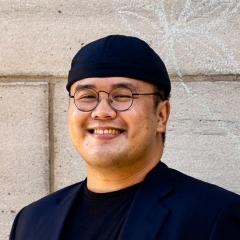Community, Public Affairs and Policy Studies (BA)
Why study Community, Public Affairs and Policy Studies?
When you study public policy, policy advocacy and community economic development, you’ll graduate ready to jump into the policy-making process in private, public and community sectors.
Our bilingual program is energized by our students, who bring a diverse range of backgrounds and a broad spectrum of community experience to each class. You study in small, congenial groups and are encouraged to pursue another Arts or Science program at the same time.
Combining academics with activism strengthens your experience. You’ll hone your sensitivity to social, economic and political factors influencing the public policy process and explore such values as:
- Social and economic justice
- Equity
- Participatory citizenship and democracy
- Cultural pluralism
You integrate the theoretical with the practical. You can do an internship, and we ground our work through close relationships with community organizations, public and private institutions, and unions.
Program highlights
- Bilingual program
- Enriching mix of theory and practice
- Course topics include social justice, equity, participatory citizenship and democracy, cultural pluralism and an internship option
Special funding for out-of-province students
Up to $4000 for undergraduate programs.
Program structure
A Bachelor of Arts degree takes a minimum of three or four years (90 – 120 credits) of full-time study, depending on your academic background.
Program options
- Major in Community, Public Affairs and Policy Studies (42 credits)
Courses
Internship
The policy process cannot be conveyed successfully without access to a “real world” laboratory. Hence, the BA Major in Community, Public Affairs and Policy Studies emphasizes practical experience to help students develop the judgment necessary to complement traditional academic training. Drawing on an innovative combination of theory and practice, the SCPA helps its students to become familiar with the fundamental intellectual tools that will enable them not only to formulate their own educated critique of their sociopolitical environment, but also to participate actively and knowledgeably in the improvement of that environment.
The internship is an important training ground. Because it demands active and imaginative responses, the internship experience is an opportunity to test theory and formulate new approaches. In addition, this period of practice is a time when our students can familiarize members of the larger community with our program, its aims and its achievements.
Support for our internship is consistently positive. Government, business and community leaders have been helpful in advising and placing our students. The experience is one that adds a very important practical dimension to our program. Success in an internship enhances a student's potential, whatever career path is chosen.
United States students: A U.S. Federal Student Aid-eligible version of this program is offered. This version meets all U.S. regulations (such as no co-operative education or e-courses) for eligible programs.
Admission criteria
Minimum cut-off averages and course requirements
- Quebec CEGEP: 24
- High School: B-
- ACT or SAT is NOT required
- Canadian curricula course requirements
- Accepted international qualifications
- International Baccalaureate (IB) diploma: 27
- International Baccalaureate Career-related Programme (CP): 4.5/7
- Baccalauréat français: 12
- British system of education (GCE):
- A-levels: At least two A-level exams CD or
- AS-levels: At least 4 AS-level exams with equivalent results or
- BTEC: Level 3 Diploma or Extended Diploma in a related subject area with equivalent results
- Additional information for British System of Education (GCE) applicants
- University Transfers (internal/external): B-
Additional requirements for admission
Interviews are conducted by phone, Zoom or in person. Please email Perry Calce, Coordinator Academic Programs and Curriculum Development at perry.calce@concordia.ca for an appointment.
Minimum cut-off averages should be used as indicators. The cut-off data may change depending on the applicant pool. Applicants who meet the stated minimum requirements are not guaranteed admission to these programs.
Application deadlines

FALL ENTRY (September)
Deadline: March 1
U.S. and international applicants: Apply no later than February 1 to allow time for immigration document processing. However, applying earlier is strongly recommended. Immigration processing times vary by country and delays could prevent you from starting your studies on time.

WINTER ENTRY (January)
Deadline: November 1
U.S. and international applicants: Apply no later than August 1 to allow time for immigration document processing. However, applying earlier is strongly recommended. Immigration processing times vary by country and delays could prevent you from starting your studies on time.
We reserve the right to close admission to a program at any time after the official deadline without prior notice.
After your degree
There are many job opportunities for graduates with our combination of academic and practical experience in public affairs. Demand is strong, particularly if you are able to express yourself in both French and English. Depending upon your choice of discipline, you can expect to pursue such diverse occupations as:
- Public affairs specialists in corporations
- Civil servants at the local, provincial, national or international level
- Public policy analysts and advisors to community and other organizations
- Community group leaders and political organizers
Student stories

Jon Marvin Reyes
Major in Community, Public Affairs and Policy Studies
Minor in Immigration Studies
In this program, I feel like I belong in the community.

Anicha Anli
Double Major in Human Environment & Community, Public Affair and Policy Studies
Anicha Anli balances being a double major with a rich life outside of the classroom as a rugby player and Sustainability Ambassador.
Other programs of interest

The First Peoples Studies program is a major designed to introduce the student to the world of First Peoples (First Nations, Inuit, and Métis), specifically within the Quebec context.
Department
School of Community and Public Affairs
Faculty

Expertise in human relationships in the community and the workplace sets you on a path towards the helping professions.
Department
Department of Applied Human Sciences
Faculty

Political science teaches you how the world works. As one of Concordia’s most popular degree choices, you will meet the world up close: in class, in action and in person.
Department
Department of Political Science
Faculty

Women’s studies is about examining the role of women in society both today and in the past, and recognizing their contributions to human achievement.
Department
Faculty

